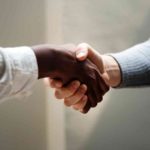Opinion: Asian American filmmaker comments on George Allen’s “macaca” slurs and the real VirginiaBy Eric Byler
On the eve of the East Coast premiere of Americanese, a film that explores racial identity and racial prejudice, I’ve found myself in the epicenter of a national reality check concerning this very subject. This fall’s midterm Virginia Senate race pits an openly racist incumbent, Senator George Allen, against a military hero and Iraq war critic, Jim Webb. Having grown up in Burke, VA from age 7 to age 12, and having spent two decades of holidays here where my mother and father have lived since 1990, I was especially ashamed by the nationally broadcast footage of Allen using a racial epithet to insult a dark-skinned Asian-American man during a speaking engagement last month. Despite Allen’s claims of having “learned” and “grown” since his years of displaying the Confederate flag and using the “N-word,” I remain deeply concerned.
Sen. George Allen: National Emblem for Racial PrejudiceIn recent days, multiple witnesses have come forward to verify Sen. Allen’s use of the “N-word” in private settings during the 1970s. As a pubic official, Sen. Allen’s record includes photographs at fundraisers with white supremacist hate groups, opposition to the 1991 Civil Rights Act, and opposition to a holiday to honor Martin Luther King, Jr. And, despite claims to have reformed his character, just a month ago, Sen. Allen twice used the word “macaca” (a racial epithet, and a word for “monkey”) to a South Asian American man, born and raised in Virginia. Video footage (distributed, debated and rebutted on YouTube) shows Allen smirking and playing to the crowd as he asks for “a round of applause to welcome Macaca to America, and the real world of Virginia.” Allen’s words are haunting because they force people in this state to ask, what is the real Virginia, and what is the real America? When I was a growing up in Burke, I did encounter racism once or twice. I looked a lot more Asian then compared to now. So, I do know what it’s like to be called a racial slur within these borders. But that is not what I think of when I think of Virginia. It’s not “the real Virginia” as Senator Allen claims. Riding the Metro today in D.C. and sitting at a cafe in Northern Virginia, I met a lot of people struggling with the Allen disgrace and how to respond. I’ve seen the Macaca racial slur video several times now. Sen. Allen claims he made the word up not knowing that it was a slur. Today I tried out his explanation on actress Allison Sie, who is also in town for the festival. She said, “It doesn’t matter. If he’d made up something like ‘ching chong ping pong,’ we’d still know what he meant by it. What matters is he pointed at a person of color in a predominantly white environment, called him a name that is not his name, and said ‘welcome to America’ to get a laugh. How can anyone doubt his intention?”
An AlternativeThe case of Sen. Allen has drawn national attention to a region of this country that, in truth, has become as diverse and multiethnic as any I have visited. Are people of color in Virginia less “real” than white folks? To suggest as much is a profound insult to any person of color and any person who believes in an America that is based on equality. Therefore, do what? There’s an election coming up. Turnout is always lower during midterm elections, and unfortunately, Asian-American turnout is on a downward trend — especially among young APAs, the “least likely to vote”. But if the Asian-Pacific American community in Virginia is silent and not heard, and if an openly racist Senator is reelected to lead this state, what would it signify to the nation about Virginia, the APA community, and American politics? I personally am spending my two weeks in Virginia volunteering for Democratic challenger Jim Webb — and not just because of the slur incident. Sadly, Sen. Allen’s public service has been as shameful as his personal conduct. He has been a rubber stamp for the Bush administration, voting with the administration 95% of the time, including on such unpopular policies as (1) supporting the invasion of Iraq without a plan for victory, and failing to fully equip, support, and protect our troops; (2) failing to fully fund our education system; (3) voting for tax breaks for the super-wealthy, while allowing middle class tax cuts to expire; (4) voting for $44 billion in tax breaks for oil/energy companies and voting to protect the war-profiteering industry, while letting Virginia’s college tuition tax credit expire. In contrast to Sen. Allen who has entirely ignored the APA population in this state, Jim Webb is married to a Vietnamese-American woman, speaks Vietnamese fluently, and has strong ties to the Asian-American community. One of the most decorated veterans of the Vietnam War, Jim Webb is a former Secretary of the Navy, a prize-winning journalist, and best-selling author. He was an early and vocal critic of the decision to create war in Iraq. In late 2002, he wrote an op-ed piece that outlined the likely consequences of a hasty and unnecessary invasion. Tragically, history has vindicated this view. Webb may not have the answers to all questions and quandaries at present, but I do think that he is a leader who will help us find a way out of our current military quagmire. He is also a problem solver with good positions on education, healthcare and the national debt, and he possesses foresight, decency and wisdom. He stands for a modern, inclusive vision of America – not “macaca America”. That’s the real Virginia and the real America that I think is worth fighting for.
On the Web
Also of Interest @ Asian-American Village
|
|||
|









